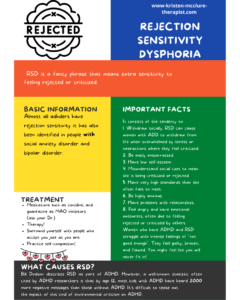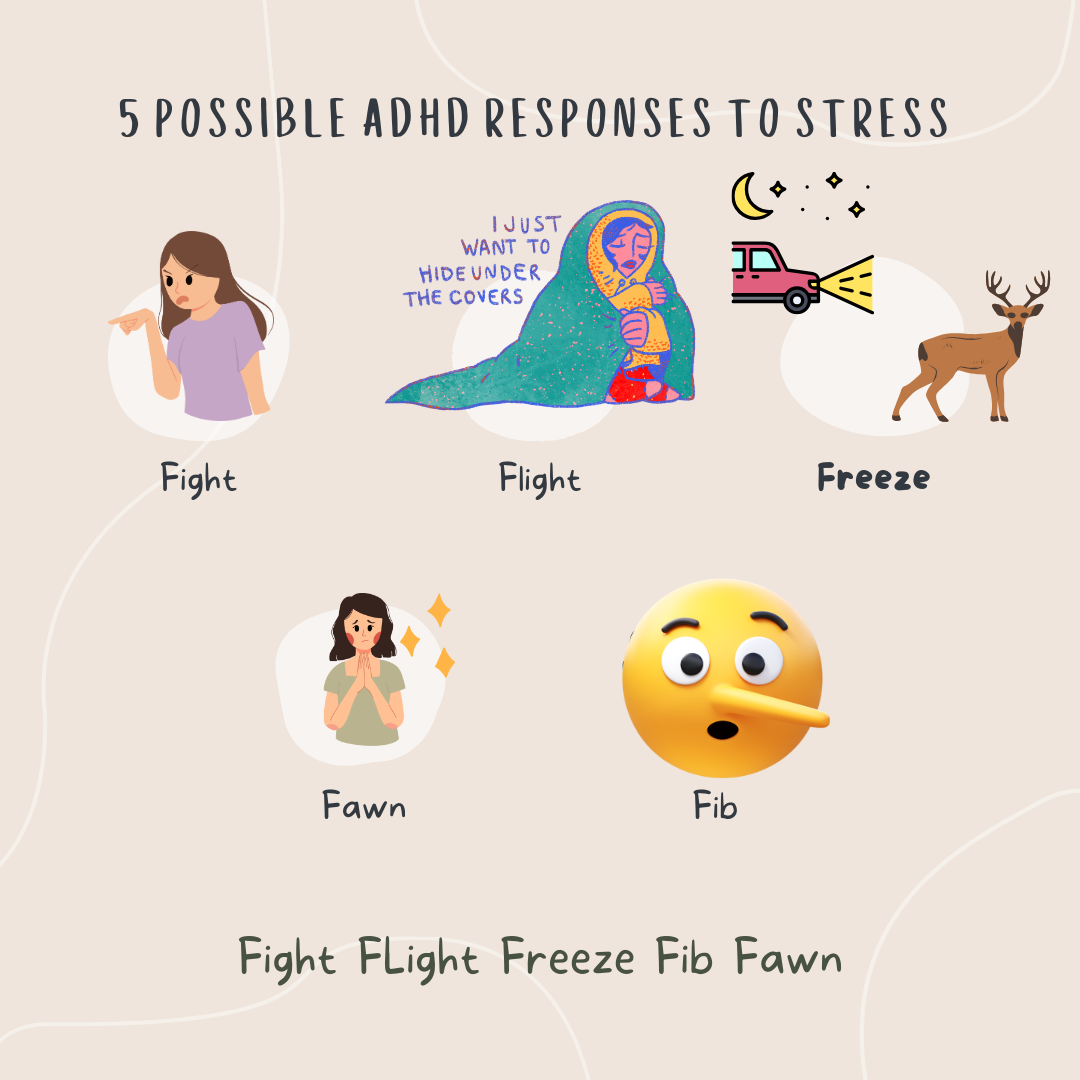
RSD and ADHD in Women: An Invisible Battle
Welcome to a detailed exploration of Rejection Sensitive Dysphoria (RSD) and ADHD. In this post, we will delve into how RSD and ADHD are intricately connected, presenting a set of traits that are frequently observed together. As someone who works extensively with women diagnosed with ADHD, I've observed RSD in every one of my clients to varying degrees. Although there isn't a specific, widely recognized estimate of how many women with ADHD suffer from RSD, the association between these conditions is clear and significant in the experiences of those affected.
Broadly defined, Rejection Sensitive Dysphoria (RSD) is a condition where a person experiences intense emotional pain ( sometimes physical) and distress in response to perceived or actual rejection, criticism, or failure. It's often associated with ADHD and involves feeling emotions such as sadness, embarrassment, anger, or shame very intensely and reacting strongly.
Just because you recognize RSD doesn't mean you have ADHD. While RSD is commonly seen in neurodevelopmental differences such as:
- 🧠 ADHD (Attention Deficit Hyperactivity Disorder)
- 🧩 Autism Spectrum Disorder (ASD),
It's also seen in mental health conditions like:
- 😨 Anxiety Disorders (e.g., Social Anxiety Disorder)
- 🌧️ Mood Disorders (e.g., Depression, Bipolar Disorder)
- 🎭 Personality Disorders (e.g., Borderline Personality Disorder).
Rejection Sensitivity is a subtype of Emotional Dysregulation
Rejection Sensitive Dysphoria (RSD) is closely linked to emotional dysregulation in individuals with ADHD. RSD is seen as a subtype of emotional dysregulation. This can lead to intense, sudden emotions, responses, and behaviors that are considered disproportionate to the situation. These "overreactions" are a form of emotional dysregulation. Additionally, the fear of rejection typical in RSD can cause people to avoid situations, which limits their opportunity to develop effective coping skills and can worsen feelings of isolation, functioning and emotional instability. Thus, RSD not only aligns with but also intensifies the emotional dysregulation seen in ADHD. Emotional Dysregulation isn't part of the diagnostic criteria of ADHD although experts recognize that it should be. This may explain why RSD isn't recognized as part of ADHD even though the statistics say they are connected.
What causes ADHD RSD?
Rejection Sensitivity Dysphoria (RSD) and ADHD: RSD is closely associated with ADHD and involves profound emotional reactions to perceived or actual rejection. 💔😞
Genetic Foundations: William Dodson highlights that RSD is a component of the emotional dysregulation seen in ADHD, suggesting a genetic basis. 🧬 This implies that some aspects of RSD can be inherited. 👪
Influence of Early Negative Feedback: Research indicates that by the age of 12, children with ADHD have typically received approximately 2,000 more negative messages compared to their non-ADHD peers. 📉 This excessive criticism can heighten sensitivity to rejection. 😢
Environmental Contributions: The development and severity of RSD are influenced by genetics and significantly shaped by environmental factors. 🌍 The interactions and experiences one has, particularly during formative years, play a crucial role. 📚
Social, Self-Protective Bias: Additionally, individuals may develop a social, self-protective bias as a coping mechanism to shield themselves from the pain of rejection. 🛡️ This protective behavior might unintentionally increase their sensitivity to any signs of rejection, further complicating their emotional response. 🔍
Complex Interplay: Understanding RSD involves dissecting the complex interplay between genetic predispositions and environmental influences. 🔄 This interaction complicates our understanding of how individuals with ADHD are affected by RSD. 🤔
What are the symptoms of RSD?
RSD isn't in the DSM yet, but many experts advocate for it to be included in the criteria for ADHD. If you are a person who struggles with RSD, you feel intensely hurt, shamed, and angry when blamed or rejected. Check if you experience this severe, intense, painful reaction when you:
- Imagine yourself being criticized or rejected
- Believe that these situations might be occurring (even if they aren't)
- Fear that they might happen
Three core symptoms of RSD include:
- Ruminating
- Self-Blame
- Physical symptoms (previously referred to as Somatization)
Rumination
One symptom of ADHD RSD in women is rumination, which is the tendency to repeatedly think about and dwell on negative thoughts and emotions associated with an episode as if you are stuck in a loop. This makes functioning really difficult by magnifying the emotional and physical pain.
Self Blame
Blaming and criticizing yourself for your emotions, thoughts, or something that happened is also part of RSD.
Body Feelings
Part of the distress of RSD is when a person may experience not just emotions but actual physical pain and physical symptoms such as headaches, stomachaches, or muscle tension as a result of the intense emotional reactions associated with RSD. RSD episodes are traumatic. Treatment from providers who understand this is essential!
Plunging into Sadness and Dysfunction
After an episode of Rejection Sensitive Dysphoria (RSD), individuals may experience a severe plunge into sadness that significantly disrupts their daily functioning. This isn't a brief moment of discomfort; rather, it's a deep, prolonged descent where minor incidents of rejection or criticism can trigger an overwhelming emotional response. This intense sadness can disrupt normal functioning for weeks, affecting the individual’s ability to handle daily tasks, engage socially, and fulfill professional obligations. Sometimes, I've seen an episode go beyond trouble with functioning and trigger preexisting mental health conditions such as anxiety or depression. Such episodes highlight the critical need for understanding and addressing RSD, ensuring that those affected receive the supportive interventions necessary to help them regain their stability and mitigate the impact of these disruptive emotional plunges.

How Often do Attention Deficit Hyperactivity Disorder and Rejection Sensitivity occur together?
The only research exploring RSD to date suggests that it is higher in women than in men (Ginapp et al., 2023).
-
For males, 3 out of 7 reported RSD. This can be expressed as a percentage: 37×100=42.86%73×100=42.86%
-
For females, 30 out of 36 reported RSD. This can be expressed as a percentage: 3036×100=83.33%3630×100=83.33%
Anectodal studies have consistently suggested very high rates of RSD in adhd people.
How does RSD impact relationships and social interactions for individuals with ADHD?
-
Women with ADHD may avoid social situations due to rejection sensitivity, leading to stress and self-criticism. This withdrawal can further contribute to emotions of depression and anxiety, isolating them from potential sources of support and connection.
-
(Attention Deficit Hyperactivity Disorder women with rejection sensitivity may avoid social interactions out of fear of embarrassment. They may mistakenly interpret others' actions or comments as unfavorable and become angry with others without provocation when embarrassed.
-
ADHD Women with RSD may have low self esteem. Continuous experience of perceived rejection, both in the mind and in reality, can significantly impact a woman's self-worth, leading to low self-esteem.
-
Women with ADHD and rejection sensitivity often misinterpret social cues, perceiving them as criticism or rejection. This can further intensify their fear and anxiety in social situations.
-
Women with ADHD and RSD may be perfectionistic. Some people with RSD may adopt standards for themselves that are impossible to meet to avoid rejection. Others, rather than aiming for perfectionism, may give up.
-
Women with RSD often have emotions of anxiety because they fear getting hurt or rejected, along with the thoughts and feelings such rejection might provoke. In fact, this is sometimes misdiagnosed as social anxiety.
-
Women with RSD may have problems with relationships. People with RSD often have trouble in relationships because they usually feel fearful that others will hurt them, imagine they will hurt them, or tolerate people who do break them!
-
Women with RSD and ADHD may feel angry and have emotional outbursts, often due to feeling rejected or criticized by others. Women who have ADHD and RSD struggle with intense emotions of "not good enough." They feel guilty, broken, and flawed. They may feel like they will never fit in! They might then explode if they perceive they are being attacked.
What makes RSD Worse?
Feeling Abandoned
-
When individuals perceive that the people they love or rely upon are pulling away or distancing themselves, it can trigger feelings of abandonment. These emotions are particularly intense for a brain prone to Rejection Sensitive Dysphoria (RSD). The fear of being left alone or the perception that someone important is withdrawing their affection or support can lead to profound emotional pain. Individuals with RSD may interpret minor changes in behavior or communication as indicators of abandonment, causing significant distress and prompting strong emotional reactions.
Feeling Left Out Socially
-
Social exclusion or the sensation of feeling left out can potentially trigger RSD. Various settings, such as not receiving invitations to gatherings, being overlooked in conversations, or feeling disconnected from peer groups, can cause this. For those with RSD, these situations can evoke intense feelings of rejection and inadequacy. The emotional response is often disproportionate to the problem because the individual's sensitivity to perceived rejection amplifies the distress and can lead to withdrawal or overcompensation in social interactions.
Underachieving Academically
-
Academic underachievement can be a significant source of distress for individuals with RSD. The inability to meet one's or others' expectations in an educational setting can feel like a profound personal failure. This experience is not just about the grades but the perceived rejection and judgment from teachers, peers, and oneself. Suppose you are afraid you won't live up to your potential. In that case, you might avoid academic challenges, be a perfectionist, or get very emotional if you don't do well academically or as well as you wanted to.
Receiving Critical Feedback at Work
Receiving critical feedback in a professional setting can be particularly challenging for someone with RSD. All feedback can feel like a sign of personal inadequacy. The emotions can be swift and intense; they very quickly ignite, leading to feelings of shame, anger, or anxiety. Individuals with RSD might find it exceptionally difficult to separate their self-worth from their professional performance, making workplace interactions that involve feedback or evaluation highly stressful and potentially triggering.
Do Doctors Misdiagnose RSD as Anxiety or Depression in Adhd People?
Yes, people diagnose RSD as symptoms of anxiety, depression, or even symptoms of borderline personality disorder or bipolar disorder in adhd women. The lack of research in this area, as well as RSD being left out of the diagnosis of adhd itself, does not help. The symptoms of RSD, such as intense fear of rejection, sensitivity to criticism, and emotional outbursts, sometimes of rage, can overlap with mood disorders. RSD is a relatively new construct and isn't widely recognized. A clinician who doesn't specialize in ADHD could make this mistake.
ADHD women must be aware of the possibility of an incorrect diagnosis being made and advocate for themselves when seeking mental health support. If you suspect that your symptoms may be due to RSD rather than anxiety or depression, it's essential to discuss this with a knowledgeable healthcare professional who understands the nuances of Attention Deficit Hyperactivity Disorder and RSD and can make the diagnosis correctly.
How Does Rsd Affect Academic Performance and Work Productivity in ADHD People?
RSD (Rejection Sensitive Dysphoria) can have a significant impact on academic performance and work productivity in individuals with ADHD.
Fear of rejection can cause you to avoid any task or challenge you might face at work and school. This can result in underachievement and a sense of personal failure, adding to their emotional distress.
Shame, the feeling that you are bad and unworthy can lead to spirals of shutting down completely and being unable to focus.
Moreover, the constant fear of rejection and the anticipation of negative feedback or thoughts that you might have failed can create a heightened sense of anxiety and stress, making your day-to-day uncomfortable. This can even lead to chronic stress and even physical illness!
What Does Therapy and Treatment for RSD Look Like?
Medication for Rejection Sensitivity Dysphoria (RSD)
Pharmacological Treatments:
- Alpha-2a Autoreceptor Agonists: Medication originally developed for hypertension, such as guanfacine and clonidine, have shown efficacy in addressing RSD symptoms in individuals with ADHD. These medications target receptors in the brain that regulate norepinephrine, a neurotransmitter involved in attention, mood, and stress response. Guanfacine is prescribed in dosages ranging from 0.5 mg to 7 mg daily and is FDA-approved for treating hyperactivity and impulsivity in ADHD. Similarly, clonidine is used in dosages from 0.01 mg to 0.05 mg daily and is also FDA-approved for ADHD treatment (Modestino et al., 2024).
- Monoamine Oxidase Inhibitors (MAOIs): These are typically used for treating atypical depression and dysphoria and have been effective in managing RSD in adults with ADHD. MAOIs work by inhibiting the enzyme that breaks down neurotransmitters like serotonin, norepinephrine, and dopamine, thus increasing their levels in the brain. They require strict dietary restrictions and careful monitoring due to potential interactions with other medications. The exact dosages for treating RSD are within the range typically used for clinical depression (Modestino et al., 2024).
Therapeutic Approaches and Techniques
- Psychoeducation: Learning about rejection sensitivity and its connection to ADHD can help women understand and validate their experiences. A recent study suggests that just knowing about RSD reduces it (Ginapp et al., 2023).
- Advocacy: Educating people about rejection sensitivity so they can adapt how they interact with sensitive individuals.
- Cognitive Behavioral Therapy (CBT): CBT helps identify and modify negative thought patterns and behaviors, while mindfulness encourages acceptance of thoughts and feelings without judgment. It's crucial that the therapist is informed about neurodiversity.
- Mindfulness and Self-compassion Practices: Incorporating mindfulness and self-compassion exercises into daily routines can help manage the emotional reactions associated with rejection sensitivity. These practices promote understanding, self-awareness, and self-acceptance.
- Support Groups: Participating in support groups, specifically tailored for women with ADHD and rejection sensitivity, provides a safe space to share experiences and gain support.
These interventions are still under research but have shown promise in reducing RSD symptoms in individuals with ADHD.
Variability of RSD Symptoms
The intensity of RSD symptoms in a person with (Attention Deficit Hyperactivity Disorder can fluctuate over time, especially in women who may notice variations in response to stress, hormonal changes, and their overall emotional state. Recognizing and adopting strategies to manage these fluctuations is crucial.
The Importance of Support Systems
When asked why they didn't have RSD, a group of rare individuals without RSD cited their support system as a key difference (Ginapp et al., 2023). Surrounding themselves with supportive people who accept and validate them as they are is tremendously helpful. Women with ADHD should be cautious of choosing partners that exacerbate their RSD symptoms, reminiscent of unhealthy childhood dynamics.
NOTE: Rejection-sensitive dysphoria can be diagnosed by healthcare professionals who are trained to recognize psychiatric and psychological conditions. This includes psychiatrists, clinical psychologists, and sometimes specialized social workers or licensed clinical counselors, particularly those with experience in ADHD and related emotional dysregulation disorders. These professionals typically use a combination of clinical interviews, patient history, and symptom assessment to diagnose RSD, especially as it relates to ADHD.
How can I help my loved one who has ADHD and RSD?
Understanding and supporting someone with RSD is crucial, as this condition involves intense emotional reactions to perceived criticism or rejection, significantly impacting their well-being. Here’s how you can help create a supportive environment:
🔹 Create Safety Through Communication:
- ✅ Non-verbal Communication: A soft gaze and a smile can create a comforting atmosphere. Remember, non-verbal cues are powerful communicators of safety.
- ✅ Tone and Non-Verbal Cues: Monitor your tone and body language to avoid unintentionally triggering feelings of rejection.
- ✅ Positive Visualization: Visualize positive scenarios or loved ones to help relax your demeanor before conversations.
🔹 Positive Reinforcement:
- ✅ 5:1 Positive Ratio: Balance difficult feedback by offering five positive comments for every negative one, promoting a positive interaction dynamic.
🔹 Manage Attention and Information:
- ✅ 30-Second Rule: Keep information brief and straightforward to prevent overwhelming your loved one.
- ✅ Maintain Neural Resonance: Slow your speech slightly to help sync your emotional states, enhancing empathy and connection.
Being an Effective Emotional Regulator:
🔹 Effective Listening:
- ✅ Listen Without Solving: Offer a listening ear without immediately jumping to solutions, which can sometimes feel dismissive.
- ✅ Avoid Minimizing Feelings: Don't compare their struggles to others’ or dismiss concerns; instead, validate their feelings.
Daily Interaction Tips:
🔹 Increase Awareness:
- ✅ Watch Your Expressions: Be conscious of your facial expressions, as they can heavily influence the emotional state of someone with RSD.
- ✅ Use Collaborative Phrases: "Would you be open to…?" or "I would love it if you…" foster cooperation instead of confrontation.
🔹 Thoughtful Engagement:
- ✅ Check-In First: Ask if it's a good time to discuss something potentially challenging to ensure they’re receptive.
- ✅ Reflect Emotions: Reflect back what they feel without judgment, affirming their feelings are heard and respected.
By incorporating these empathetic strategies, you can help mitigate the intense experiences associated with RSD, fostering a nurturing and supportive relationship. These approaches are based on the principles of emotional intelligence and effective communication, which are crucial in handling sensitive interactions and enhancing relational bonds.
RSD FACT SHEET
If you like this information, you can download a fact sheet here at the link below





